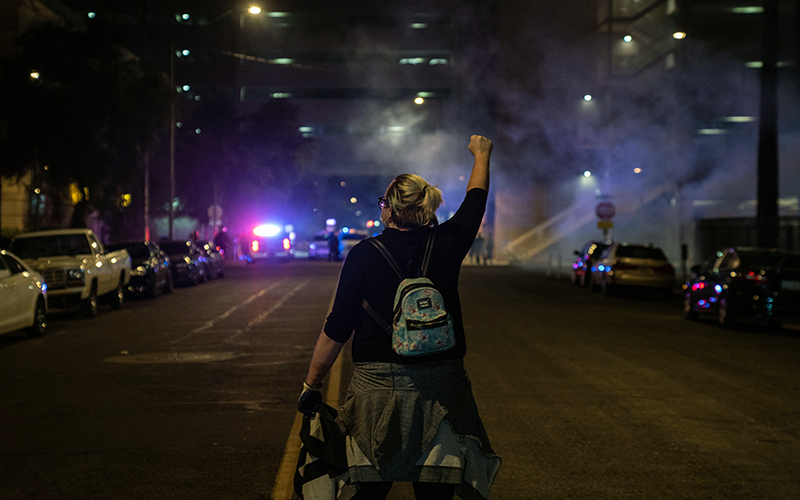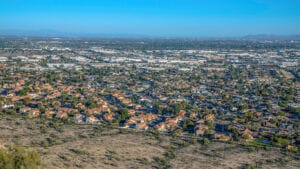A cry of “I can’t breathe” in Minneapolis has reverberated thousands of miles away in Arizona, where protesters for several days have marched in sorrow and rage – peacefully for the most part, but sometimes clashing with police and looting and vandalizing several businesses in Phoenix and Scottsdale.
Arizonans are reacting to and taking action following the May 25 death in Minneapolis of George Floyd, 46, and Dion Johnson, 28, who was killed by an Arizona state trooper the same day. Cronkite News spoke with several people about the protests, including a college activist who stresses the need for real activism outside of Instagram, an interior designer who wants others to realize what is meant by Black Lives Matter, and a business owner who’s worried about looting and vandalism but hopes the protests will bring real change.
Head of black mothers’ group says policing must be transformed
Deborah Colbert has been active in the civil rights movement for 50 years, beginning her lifelong journey of fighting for black people when she was about 12. Although there have been tremendous changes in the movement, Colbert said, the lack of sustained progress deeply troubles her.
“It’s almost like reliving the pain and agony of being an African American in America again,” she said. “The feeling for me is, ‘When? When will we really come together and see that it’s time for us to realize that there’s a humanitarian feature missing here?’”
Colbert works with Black Mothers Forum, a nonprofit addressing the disproportionate disciplinary actions toward black children. The forum educates teachers, parents and young people on how to better advocate for themselves.
In 2014, data from the U.S. Department of Education Office for Civil Rights showed that black students were suspended and expelled at a rate three times greater than white students. The same study showed that in the 2011-12 school year, black male students made up 19% of all school suspensions, which was more than any other race.
Colbert said education is the foundation of any social progress, but there will be no permanent progress unless people tap into their own feelings around race and injustice first. This differentiates the people who commit to speaking out when they see inequality from those who are a part of the “checklist society,” she said, referring to those who study injustice because they feel it’s expected of them, but then don’t use that knowledge to exact change.
The Black Mothers Forum is open to allies and those willing to do the work of examining their own perspectives and further their message of unity. As for the protests over Floyd’s death, Colbert said she is disheartened by those who are “hijacking” the demonstrations because they are distracting from the movement.
“The real issue is equality, fairness and justice,” she said. “And a culture of policing that must be transformed. It can’t be reformed. It must be transformed.”
– Allie Barton
Activism is much more than posting on Instagram
Sahara Sajjadiankhah attended a peaceful protest organized by the Inclusive People’s Organization at Phoenix police headquarters on Sunday with several of her friends. The 18-year-old, who’s an activist in Black Lives Matter, came prepared with a homemade sign, one side emblazoned with a Malcom X quote and the other with a simple phrase – “Stop killing black people. It shouldn’t even need to be said.”
Sajjadiankhah said she’s grateful her family supports her activism. But she has been criticized by some people who consider protests, even peaceful ones, to be destructive and ruinous.
“We would be such a regressed country if we never questioned things, if we never took to the streets,” Sajjadiankhah said.
She questions the intentions of people who think it’s enough to post their solidarity on social media rather than take direct action. Although the majority of Americans feel that social media activism is an outlet for underrepresented groups to share their voice, a study from Pew Research Center found that 71% think that “social media makes people believe they’re making a difference when they really aren’t.”
Sajjadiankhah and her friends had recently talked about the “cringe” posts they’ve seen on social platforms – Instagram in particular – and she said she’s wary of people who are louder on social media than they are in real life. It would be more helpful to attend protests, sign petitions or make calls to legislators, she said.
“It’s hard to know if people are being genuine or do they feel like, ‘Oh, this is a cute Instagram graphic, so I should put it on my story and seem like a good person,’” Sajjadiankhah said.
– Allie Barton
Of course ‘all lives matter.’ But there’s more to it.
Floyd’s death spurred Marisa Colbert, 22, an interior designer from Mesa, to attend her first protest Sunday night in downtown Phoenix.
Colbert, who’s black and Hispanic, said she grew tired of hashtag activism and others reaching out to her online as a resource to educate others.
“I felt like speaking out on social media just isn’t enough sometimes,” she said. “You can kind of feel like you’re shouting into a void when you’re behind a screen. Being out there, and being surrounded by hundreds of other people who are there for the same case that you are, is very empowering.”
Colbert said she doesn’t advocate for violence but understands why it may occur, citing decades of injustice.
The news media also could improve how it covers protests, Colbert said. Instead of giving attention to the few who broke windows at Scottsdale Fashion Square, place an emphasis on the majority of peaceful protests, she suggested.
Colbert also has another lesson: Of course, all lives matter, but the Black Lives Matter movement is about the specific danger that black people encounter with aggressive policing.
“If you’re Arabic, if you’re Hispanic, black or white, it doesn’t matter. We all know that those lives matter,” she said. “But the fact is that, continuously and throughout the years, it’s been shown that black lives do not matter to a large number of people. And that’s what we’re trying to show.”
– Jonathan Hernandez Morales
March for Our Lives leader marching for lives again
Jordan Harb, 19, of Mesa, is a protest veteran. One of the leaders of March for Our Lives, the youth-led movement against gun violence that emerged in 2018, he showed up Sunday in Phoenix to protest.
Harb emphasized on Monday that the vast majority of those protesting were peaceful and tried to stop anyone who tried to cause problems for the protesters or police.
“The protest was relatively peaceful,” he said. “When the curfew did hit 8 o’clock, a couple people were trying to get hurt and be confrontational with the police. But the crowd stopped them and continuously throughout the night, kept checking people anytime” they saw a skirmish.
He said his family background, including family members who are refugees from Lebanon, help spur his desire to get involved in issues of injustice.
“They experienced quite a lot of racism just in general,” he said. “And so I’d see myself more as just coming out and fighting for the rights of people.”
– Jonathan Hernandez Morales
Chanting in unison, allies stand against police brutality
As a Latinx woman and ally of the Black Lives Matter movement, Emma Galligan, 20, of Tucson, found a place to use her voice: the streets of downtown Phoenix.
Galligan walked alongside protesters on Friday and Sunday equipped with water, a face mask and phone numbers written on her wrist in case of an emergency. Gilligan has learned many tricks about being safe while protesting, including always going with friends and preparing for as many scenarios as possible.
She said she chose to walk in Phoenix specifically to take a stand against higher rates of police violence in the city.
In 2018, the Phoenix Police Department had 38 officer-involved shootings – more than any other police force in the country, according to ABC 15. A 2018 analysis by The Arizona Republic said that, on average, a Phoenix police officer shot at someone every five days.
“I’ve grown up with this idea that police brutality exists,” Galligan said. “Police should not be getting away with taking lives of people. I don’t want to sit on the sidelines.”
Galligan said it is important as a person who is not black to support those in need or who are suffering right now. This means sharing information, signing petitions and donating to groups that aid protesters and Black Lives Matter supporters, she said.
Although Galligan chose to protest, she said this may not be an option for others. For people with weakened immune systems or other at-risk individuals, large gatherings such as protests could bring on a higher risk of catching and suffering complications from COVID-19.
However, she said being an ally can happen anywhere and take many forms. Galligan plans to attend future protests until she sees change occur.
“Remember not to take up space as a non-black person,” she advised, “and to follow the lead of the organizations that are black-led.”
– Katelyn Reinhart
Scottsdale business owner hopes protests bring change
CEO Leslie Silverglide had just reopened the new Scottsdale location of her restaurant MIXT when she was forced to close her doors for a second time Monday.
The salad chain has locations in several states, some of which have been damaged by protesters in the wake of Floyd’s May 25 death.
Her restaurant in Scottsdale Quarter has not been targeted, but Silverglide closed the doors because of the looting and vandalism Sunday night at Scottsdale Fashion Square.
The decision was in the best interest of her staff, she said, but Silverglide was disappointed because she had recently reopened after Arizona lifted the stay-at-home order enacted in March to slow the spread of COVID-19.
“It’s been hard, but we’re doing the best we can,” she said. “The most important thing for us is keeping our team safe and with just so much uncertainty about what’s going on, we ultimately made the decision to not even open up the restaurant today.”
She said other businesses in the Scottsdale Quarter have shut down, including several that boarded up doors and windows.
Despite the economic toll on her business, Silverglide does not want the conversation to focus on the looting.
“It’s very easy to have this conversation around rioting and vandalism, but I think the real underlying issue is that we need to talk about is bias, living in fear, and honestly, pent up frustration that many people feel about the slow pace of change,” she said.
Silverglide and her staff are hoping to reopen as soon as Tuesday, but she first wants to be sure it’s safe for her employees – and that customers still want to come.
“I’m heartbroken that this is going on. I’m heartbroken over what happened. Ultimately my hope is that this does lead to positive change, and we’ll be better because of it,” she said.
– Nicole Soto
With police helicopters overhead, protesters scramble for aid
An hour after the first night of a weeklong statewide curfew started at 8 p.m. Sunday, at least three police helicopters, their searchlights slicing the darkness, hovered over a downtown Phoenix neighborhood near Seventh and Portland streets. Clumps of protesters, some coughing, ran through the streets.
A few police cars parked along the streets in the area.
People across the street at one another, asking if they were OK. Some neighbors handed out bottles of water. One girl told her friends she had asthma but didn’t have her inhaler.
Some people stood on the sidewalk, waiting for someone to pick them up.
By 10:30 p.m., the streets were emptied of protesters. Police remained behind.




